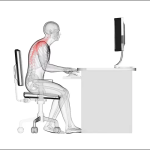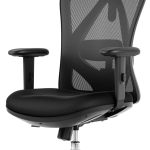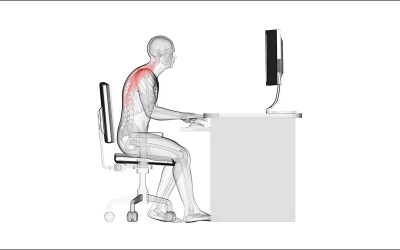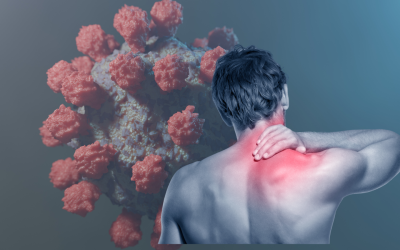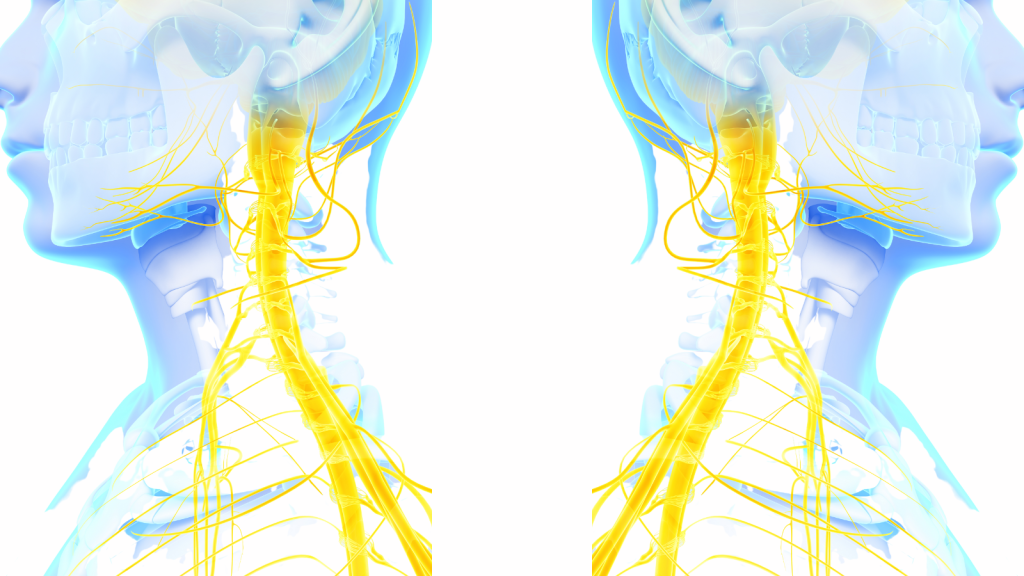
Neck pain is a widespread problem and can cause significant pain and disability. Cervical radiculopathy is the medical term for what is otherwise known as a “pinched nerve.” This is a common condition that can occur when spinal nerves or nerve roots around the cervical spine (bones of the spine that form the neck) get compressed and thereby, inflamed.
How do you know if you have a pinched nerve in your neck?
The most common symptoms of a pinched nerve are as follows:
Pain only in one arm
Issues caused by a pinched nerve are almost always unilateral (affecting one arm only). Although, in rare cases, both nerves at a given spinal level may be affected.
Pain in the neck and radiating tingling sensations
Pain either at or around the neck is common. However, a tingling sensation radiating to the chest, to the shoulder, throughout the upper and lower arm, and sometimes up to the hand may also be seen in these cases.
Limited Range of Motion of the Neck
Restriction in the neck’s range of motion may be seen as certain neck positions may trigger the tingling or cause sharp shooting pain.
Loss of sensation
Loss of sensation can occur depending on the level of nerve root or the type of nerve involved.
Loss of Strength
Loss of strength may be seen particularly due to weakness in the shoulder or elbow muscles. This strength reduction would also depend on the nerve that is involved and which muscles it supplies/innervates.
Check your neck using NeckCheckup.com
Use our free assessment tool to measure your neck range of motion. Click here to measure your neck range of motion.
What is the best treatment for a pinched nerve in your neck?
The treatment for a pinched nerve can be divided into home remedies, medical (non-surgical) or surgical treatment options. Treatment of cervical radiculopathy should be approached in a stepwise fashion.
Home remedies
Home remedies, or natural remedies for a pinched nerve in your neck are treatments you can do at home. The best natural home remedies for a pinched nerve in your neck are:
Rest
As mentioned before, sometimes pinched nerves do not need any treatment. They heal on their own. Adequate sleep, a healthy diet and caution to avoid pain-provoking activities may resolve the radiculopathy.
Anti-Inflammatory Drugs
Oral anti-inflammatory drugs: Since the main cause of pain in cervical radiculopathy is inflammation, over-the-counter drugs known as NSAIDs (Non-Steroidal Anti-Inflammatory Drugs) can help alleviate the pain and curb the inflammation.
Neck Brace
Cervical collar: A short-term use of a soft cervical collar can provide some support and relief. Also known as a neck brace.
Medical/ Non-surgical
Over 85% of acute cervical radiculopathy cases resolve without any specific treatments within 8-12 weeks. However, in order to facilitate reduced inflammation of the nerve root(s) and improve radiculopathy, it is essential to implement non-surgical treatments.
Physical therapy:
A well-designed physical therapy program can provide significant relief. An exercise protocol involving appropriate muscle strengthening, stretching, cervical traction and ergonomic advice usually improve the patient’s sympotms. In the setting of surgical intervention physical therapy can speed recovery.
Oral corticosteroids:
Corticosteroids are anti-inflammatory drugs that are stronger than NSAIDs. However, these are not the primary choice of drug as they have their own set of side effects.
Translaminar epidural steroid injections:
In case oral corticosteroids do not work, doctors may prescribe injecting a steroid injection into/around the affected area. Studies have shown that epidural steroids can provide significant relief and speed the return to normal functioning for many patients. Relief from a single treatment can be significant and long-lasting. Half of the patients treated have reported relief of at least 50% for weeks following injection.
Surgical treatments for pinched nerve in your neck
When non-surgical treatment has failed to relieve pressure on the nerves, surgery is the last option for treating a pinched nerve. Surgical techniques can be done utilizing anterior or posterior approaches. Both approaches are found to be effective.
One of the following options is available:
- Anterior cervical discectomy and fusion (ACDF)
- Cervical disc replacement (CDR)
- Minimally invasive posterior cervical foraminotomy (MI-PCF)
Essential oils for pinched nerves
Cervical radiculopathies, often cause pain leading to muscle spasm (a state in which the muscles tighten up due to pain). Thus, relaxation with essential oils can help loosen up muscles and breaking the pain-spasm cycle.
How can you prevent a pinched nerve in your neck?
Certain measures can be taken to prevent your nerve from getting pinched. Some of them are:
Maintaining a good posture
Physiologically and mechanically the ideal posture is a straight neck with the chin tucked in.
Stretching and strengthening your muscles.
Avoid sitting in the same position for too long.
Investing in ergonomic work equipment
If your work includes repetitive motions such as typing whilst looking at the screen and for long hours, getting your work equipment modified in a manner that is more suitable for you can help prevent cervical radiculopathies.
Quit Smoking
Smoking can also increase your chances of getting radiculopathies and thus should be quit.
What are some stretches that can help relieve the pain of a pinched nerve in the neck?
The type and extent of exercises are to be planned according to your needs, inabilities, and comfort. However, the exercises shown below may help relieve the pain caused by a pinched nerve in the neck.
(All images are taken from Kisner Carolyn and Lynn Allen Colby. 2012. Therapeutic Exercise: Foundations and Techniques. 6th ed. Philadelphia: F.A. Davis.)
Chin tucks
Neck flexion and extension range of motion exercise
Self-resisted isometric neck flexion and extension
Scapular retractions
Trapezius and scalene muscles stretching
When should you see a doctor for a pinched nerve in the neck?
A few symptoms can be alarming and warrant a visit to the doctor. Some of them are:
- Pain out of proportion
- Tingling or numbness that doesn’t reduce or go away after a week
- Extreme muscle weakness
- Diminished reflexes in your arm
- Neck pain due to trauma or an accident
How to sleep with a pinched nerve in the neck?
It goes without saying that having neck pain makes it much more difficult to find a sleeping position that is pleasant. Sleeping on your back or on one of your sides is advisable. Sleeping on your stomach must be avoided as it necessitates an extreme rotation of your neck. However, the nighttime use of a cervical pillow can provide symptom relief and make sleeping easier during recovery.

